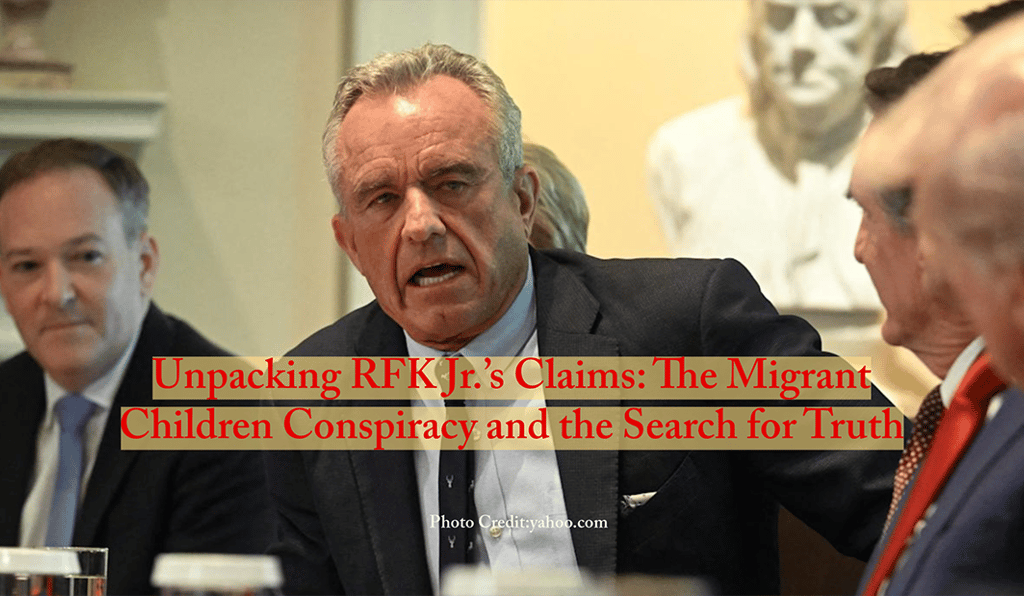Unpacking RFK Jr.’s Claims: The Migrant Children Conspiracy and the Search for Truth
5/3/20253 min read


Unpacking RFK Jr.’s Claims: The Migrant Children Conspiracy and the Search for Truth
Introduction: A Shocking Allegation
In a recent White House Cabinet meeting, Health and Human Services (HHS) Secretary Robert F. Kennedy Jr. made headlines by claiming that his department has ended its role as a “principal vector” in child trafficking, alleging that under the Biden administration, HHS facilitated the trafficking of 300,000 migrant children for sex and slavery. The claim, rooted in an assertion by former President Donald Trump, has been widely labeled a conspiracy theory, with experts pointing to a lack of evidence. But what’s behind these explosive allegations, and why do they resonate with some while being dismissed by others? Let’s dive into the facts, the context, and the questions this controversy raises.
The Claim: 300,000 Missing Children
RFK Jr.’s statement echoes a narrative pushed by Trump, who claimed during his campaign that over 300,000 unaccompanied migrant children “disappeared” under Biden’s presidency, potentially falling into the hands of traffickers. The figure comes from a 2024 Department of Homeland Security (DHS) inspector general’s report, which noted that 32,000 unaccompanied minors missed immigration court hearings between 2019 and May 2024, and another 291,000 did not receive court notices. The report flagged these children as being at “higher risk for trafficking, exploitation, or forced labor” but did not conclude they were trafficked.
Experts like Aaron Reichlin-Melnick from the American Immigration Council argue this is a “paperwork issue,” not evidence of mass trafficking. Many of these children are likely living with relatives in the U.S., but bureaucratic gaps—such as outdated addresses or missed court dates—create the appearance of “missing” status. Reichlin-Melnick emphasizes that “missing a court hearing doesn’t mean something bad happened to them.”
RFK Jr.’s Role and the Conspiracy Label
As HHS Secretary, RFK Jr. oversees the Office of Refugee Resettlement (ORR), which places unaccompanied migrant children with sponsors, often family members. His claim that HHS was a “collaborator” in trafficking under Biden has been met with skepticism. Critics point to a 2023 New York Times investigation that found some migrant children faced exploitative labor conditions after being placed with sponsors, but this is a far cry from systemic government-orchestrated trafficking.
RFK Jr.’s history of promoting controversial theories, from vaccine skepticism to 9/11 doubts, adds fuel to the criticism. Medical experts and advocacy groups have expressed alarm over his appointment, citing his track record of spreading misinformation. A Washington Post article highlighted concerns from health professionals about his leadership of HHS, given his long-standing anti-vaccine activism. Meanwhile, posts on X reflect polarized sentiment, with some users praising RFK Jr. for “exposing” trafficking, while others dismiss his claims as fearmongering.
The Broader Context: Migrant Children and U.S. Policy
The issue of unaccompanied minors at the U.S. border is complex. During Biden’s term, ORR struggled to keep track of some children after placement, raising legitimate concerns about vetting and follow-up. A 2022 whistleblower from an HHS facility in Pomona, California, alleged lax oversight in processing minors, though no evidence confirmed deliberate trafficking. The Trump administration’s family separation policy in 2018 also drew criticism for losing track of children, showing that both parties have faced challenges in this area.
RFK Jr. and Trump’s border czar, Tom Homan, claim the current administration is aggressively locating these “missing” children, with DHS reporting 5,000 reunifications in Trump’s first 70 days. However, critics argue the “missing” label is misleading, as many children were never lost—just untracked by an overwhelmed system.
Why This Matters
The allegations tap into deep public fears about child safety and immigration, amplified by political polarization. For supporters, RFK Jr.’s claims align with distrust in government institutions, especially after high-profile cases like Jeffrey Epstein’s trafficking ring. For detractors, they’re a distortion of bureaucratic failures, weaponizing real issues to score political points. The lack of concrete evidence for systemic trafficking risks overshadows genuine problems, like the need for better sponsor vetting or support for vulnerable minors.
What’s Next?
RFK Jr.’s leadership at HHS will likely keep this issue in the spotlight. His promise to “aggressively” find these children could lead to policy changes, but without clear data, the narrative risks fueling division rather than solutions. The truth lies in addressing systemic gaps—better tracking, stronger oversight, and protections for migrant children—without succumbing to unverified claims.
Thought-Provoking Questions
How can we separate legitimate concerns about migrant children’s safety from exaggerated or unproven claims?
What steps should HHS take to ensure unaccompanied minors are protected without fueling divisive narratives?
Does RFK Jr.’s history of controversial statements undermine his ability to address real issues at HHS, or does it amplify necessary debates?
Conclusion
RFK Jr.’s trafficking allegations have sparked a firestorm, blending real immigration challenges with unproven conspiracies. While the plight of unaccompanied minors demands attention, the truth requires nuance, not sensationalism. As HHS navigates this issue, the focus should be on protecting vulnerable children, not perpetuating fear. What do you think—where does the line between truth and conspiracy lie? Share your thoughts at boncopia.com!
hello@boncopia.com
+13286036419
© 2025. All rights reserved.